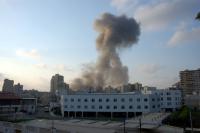-
U.S. destroys large ISIS chemical weapons manufacturing facility
The U.S. on Monday destroyed an ISIS chemical manufacturing facility in Iraq, which posed a “significant chemical [weapons] threat.” Footage of Monday air strikes showed twelve aircraft hitting a sprawling industrial site in Mosul. The hits were followed by huge explosions in multiple buildings and storage facilities. The buildings were quickly engulfed by flames, and heavy plumes of dark smoke rose into the air. USAF spokesman said that fifty individual targets were hit in the attack.
-
-
U.S., Israel sign record 10-Year, $38 billion defense package
After nearly a year of negotiations, Israel and the United States have signed a record $38 billion, 10-year military aid package. The deal is “the single largest military assistance package — with any country — in American history,” American ambassador to Israel Dan Shapiro said
-
-
Report: Hamas spends $100 million annually to build up its military infrastructure
Hamas spends an annual $100 million on its military infrastructure in order to prepare for its next war against Israel. Roughly $40 million is spent on employing around 1,500 diggers to build the Iran-backed terror organization’s network of tunnels. Despite the financial hardships experienced by Gaza residents, Hamas, which in 2014 had a budget of around $530 million, is intent on increasing its military spending. In addition to digging tunnels, it hopes to upgrade its capabilities, which were degraded during its war with Israel two years ago, and is seeking to develop more precise rockets that could evade Israel’s Iron Dome defensive shield.
-
-
Why ratifying the Chemical Weapons Convention is in Israel’s best interest
When the time came to commemorate the 100th anniversary of the first major use of chemical weapons, it seemed there was at last a real chance of ridding the world of all chemical weapons in the very near future. Almost all countries had already joined the Chemical Weapons Convention (CWC), which commits countries to the supervised destruction of all stockpiles of chemical weapons – with only two states as yet unwilling to sign: North Korea and Egypt. But there’s another exception: Israel, which has signed the convention but is refusing to ratify it. Chemical weapons have no place in a civilized society. They have little to no use as a tactical deterrent, and their effects are indiscriminate and appalling. We have a unique opportunity to rid the world of this scourge, and we’re so close to doing so. It’s high time Israel joined the rest of the world.
-
-
Syria chlorine attack claims: what this chemical is and how it became a weapon
New claims that the Syrian government has dropped barrel bombs full of chlorine on a suburb of Aleppo are the latest in a series of allegations of chemical weapon use. Although the Syrian government denies using chemical weapons, a recent UN-led enquiry found it had used chlorine on at least two occasions. The first gas attack using chlorine was launched on 22 April 1915 in the trenches on the Western front, near Ypres. Gas masks were developed to protect against chlorine attacks and other chemical warfare agents were developed. But chlorine remains the simplest chemical weapon and reappeared on the battlefield during the Iraq War and allegedly now in Syria. In the Second World War, both sides of the conflict knew that the other side had weaponized chlorine and refrained from using it. Today in Syria, it sadly appears this may not have been the case.
-
-
Rules governing targeted killing by U.S. drones need clarifying
Since the beginning of the conflicts in Iraq and Afghanistan, the United States has dramatically increased use of unmanned drones, developing technology to target and kill those identified as being terrorist leaders. Current U.S. policies on using drones for targeted killing are characterized by ambiguities in interpretations of international law and too many generalities, despite recent efforts by the Obama administration to clarify the policies, a new report finds.
-
-
Strengthening national security by improving intelligence software
An intelligence analyst hunting for answers in a sea of data faces steep challenges: She must choose the right search terms, identify useful results, and organize them in a way that reveals new connections. Making that process quicker and more intuitive could yield faster answers to key national security questions. Researchers are developing intelligence software that allows analysts to interact more closely with their data.
-
-
Libya’s remaining chemical weapons materials removed

The director-general of the Organization for the Prohibition of Chemical Weapons (OPCW), ambassador Ahmet Üzümcü, announced a milestone in the operation to verifiably eliminate Libya’s remaining chemical weapons stocks by confirming that the chemicals have been successfully removed from Libya on 27 August 2016.
-
-
Ex-Shin Bet chief: Hezbollah “learning to fight on a large scale” in Syria, threatening Israel
The Iran-backed terror group Hezbollah is gaining valuable experience while “learning to fight on a large scale” in Syria, a former Shin Bet chief told a visiting delegation of U.S. congressional advisers last Monday. Avi Dichter, currently the chairman of the Knesset’s Foreign Affairs and Defense Committee, said Hezbollah in Syria is “learning to fight on a large scale, in platoons and battalion, while using sophisticated weaponry and heavy, precise arms that they receive from Iran.” These new capabilities will ensure that the “next round” in the conflict between Hezbollah and Israel will be much different.
-
-
Watchdog: Evidence suggests Assad kept chemical weapons program in violation of 2013 deal
After launching a lethal sarin gas attack in August 20013 — which killed 1,400 Sunni civilians in a Damascus suburb — the Assad regime agreed to get rid of its nerve agents under the supervision of OPWC, the UN chemical weapons watchdog. In summer 2014 OPCW announced that Syria’s declared chemical weapons stockpile had been removed – but in a classified report submitted Wednesday to the Security Council, OPWC says that Syria has violated the 2013w agreement by keeping some of its chemical weapons program, and by continuing to use chemical weapons in attacks against civilians.
-
-
U.S. has given 1.4 million guns to Iraq, Afghanistan -- but doesn’t know where, by whom these weapons are currently being used
The United States has given more than 1.4 million guns to Iraqi and Afghan forces, as part of the more than $40 billion worth of U.S. Department of Defense arms and munitions contracts since 9/11. The Pentagon has only partial, and not necessarily accurate, information not only about the total number of firearms involved, but how, where, and by whom these weapons are currently being used. Journalists have offered evidenced that many firearms openly available for purchase on black markets and on social media throughout the Middle East were originally provided by the Pentagon to U.S. associates in Iraq and Afghanistan.
-
-
Iran threatened to halt nuke talks if U.S. bombed Assad, WSJ reporter says

President Barack Obama changed his mind about launching a retaliatory strike against Syrian President Bashar al-Assad, whose forces carried out a sarin gas attack that killed more than 1,400 people in August 2013, after Iran threatened to pull out of then-secret nuclear talks, the chief foreign correspondent for the Wall Street Journal said on Monday.
-
-
1967 solar storm jammed USAF radars, nearly taking U.S. to brink of war
A solar storm that jammed radar and radio communications at the height of the Cold War could have led to a disastrous military conflict. On 23 May 1967, the Air Force prepared aircraft for war, thinking the nation’s surveillance radars in polar regions were being jammed by the Soviet Union. Just in time, military space weather forecasters conveyed information about the solar storm’s potential to disrupt radar and radio communications. The planes remained on the ground and the United States avoided a potential nuclear weapon exchange with the Soviet Union, according to the new research.
-
-
Young engineers compete for RoboSubs
After months of planning, building, programming, testing, and tweaking, it all came to down to this one moment — the 19th annual International RoboSub Competition, held in San Diego, California, 25-30 July.
Forty-six teams competed in this year’s event. The robotics contest challenges students to design, build and race submarines through a complex obstacle course, where points are awarded for the number and difficulty of successfully completed mission tasks.
-
-
Expert: Hezbollah’s storage of missiles in civilian areas will make next war “catastrophic”

The next war between Israel and Hezbollah “will be catastrophic” because the Iran-backed terror organization has stationed its military assets inside “built-up population centers in cities, towns and villages” in Lebanon, says an expert. In 2006 Hezbollah only had around 12,000 rockets and missiles at its disposal. It is now believed to have more than 110,000. Some analysts estimate that Hezbollah’s rocket and missile arsenal is greater than that of all twenty-seven non-U.S. NATO nations combined.
-
More headlines
The long view
Factories First: Winning the Drone War Before It Starts
Wars are won by factories before they are won on the battlefield,Martin C. Feldmann writes, noting that the United States lacks the manufacturing depth for the coming drone age. Rectifying this situation “will take far more than procurement tweaks,” Feldmann writes. “It demands a national-level, wartime-scale industrial mobilization.”
